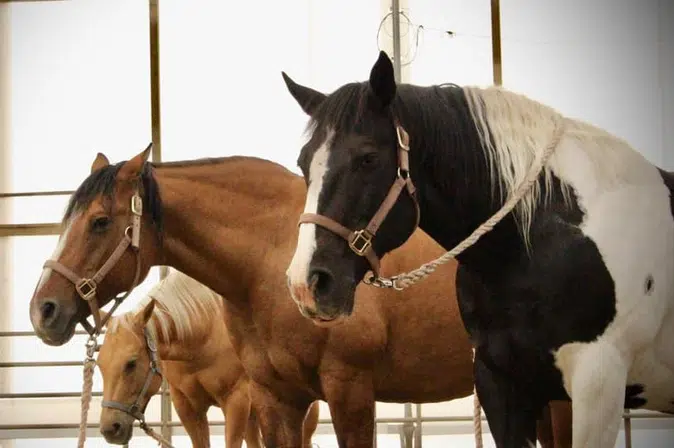By
A research study is being done in the Prince Albert area trying to determine whether or not horses can help emergency responders managing PTSD.
Cartier Farms has partnered with McMaster University to see if Equine Assisted Learning (EAL) could be a viable treatment to help with symptoms and improve functionality.
The goal is to get 80 participants split into four different rounds. They will then be split again with one half getting to experience EAL treatment, while the other half does not.
“We’ll figure out if there are differences in those two groups that would suggest that the EAL helped or didn’t help,” said Ashley Williams, postdoctoral fellow with McMaster University’s trauma and recovery unit.
After the study, those who didn’t get to take part in the sessions will be able to do so.
As for those chosen for EAL treatment during the study, they’ll get to take advantage of two sessions a week over an eight-week period.
(Cartier Farms/Facebook)
Each participant, whether they’re getting the treatment or not, will be interviewed before the study, when it finishes, and then three months down the road.
Williams explained this is a relatively new area of research. She noted there has been some work done looking into horses helping veterans.
“There seems to be some indication that it could be helpful for veteran populations so we wanted to see what this would look like for public safety populations,” Williams said.
She added they understand veterans and emergency responders are two different groups, however, they are professions with exposure to trauma.
Meanwhile, those interested in taking part would have to be in the Prince Albert area for the entirety of the eight-week study since Cartier Farms is located just north of Saskatchewan’s third biggest city.
Gayle Cartier, co-owner of Cartier Farms, said she’s excited to see if their horses can make a difference in emergency responders’ lives.
She explained they were asked to take part after helping with two provincial studies.
“They were looking at the wellness that horses have in EAL with participants that are dealing with some sort of trauma or issue with wellness in general,” she said.
This study is expected to be more scientific, while also focusing on a specific group of people.
She’s also hoping this will prove that EA can be a successful therapy used in conjunction with other treatments and interventions.
The plan is to have the first round of the study start up in the spring.
Those interested in learning more about the study, including potentially participating, can call 647-551-2701, email ealteam@mcmaster.ca, or provide contact information to the research team online.












